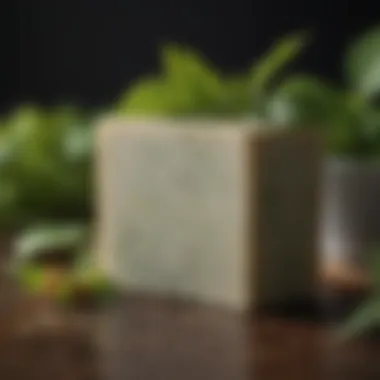The Ultimate Guide to Poison Ivy Soap Treatments


Key Takeaways
This article explores the effective solutions for alleviating the discomfort of poison ivy exposure. Here are the essential points covered:
- Causes of Poison Ivy Rash: Understanding the urushiol oil, the toxic compound responsible for the rash.
- Symptoms: Identifying common symptoms such as itching, redness, and swelling.
- Importance of Treatment: Early intervention can mitigate severe reactions and discomfort.
- Effective Ingredients: Key components in soap formulations that relieve irritation.
- Top Brands: Notable brands that provide reliable products for poison ivy rash.
Statistics indicate that up to 50% of individuals who are exposed to poison ivy will develop a rash, highlighting the relevance of effective treatments.
Understanding Poison Ivy Rash
Poison ivy, scientifically known as Toxicodendron radicans, contains a compound called urushiol. This oil can lead to allergic reactions in susceptible individuals. Symptoms often appear within 12 to 72 hours after contact. Common reactions include:
- Intense itching
- Redness and swelling
- Blisters that may ooze
Recognizing these symptoms early is crucial for effective treatment. Ignoring them can lead to prolonged discomfort, escalating to more significant health issues.
Importance of Prompt Treatment
Treating poison ivy rash promptly is essential. Delaying treatment can worsen the condition. The onset of severe symptoms may require medical intervention. Soap designed for poison ivy can help to cleanse the skin, removing urushiol and reducing irritation. Using these soaps as soon as possible can ease symptoms and promote healing.
Effective Ingredients in Poison Ivy Soaps
Many products on the market claim to relieve poison ivy symptoms. However, understanding the ingredients used in formulations can lead to informed choices. Key ingredients to look for include:
- Activated Charcoal: Extracts toxins and can aid in cleansing the skin.
- Calamine: Known for its soothing properties, it can reduce itching and discomfort.
- Aloe Vera: Offers hydration and helps to soothe inflamed skin.
- Zinc Oxide: Provides a protective barrier while calming irritated skin.
Understanding these ingredients can help health professionals recommend suitable products to clients.
Notable Brands in Poison Ivy Soap
Several brands have established themselves in the market for effective poison ivy treatment soaps. Some noteworthy mentions include:
- Tecnu: A recognized name known for its decontamination products.
- Ivyswab: Offers specialized products for urushiol removal.
- Dove: Their formulations often include soothing ingredients beneficial for itchy rashes.
These brands offer unique formulations that can cater to individual needs.
Practical Tips
Here are actionable steps to deal with potential exposure and aftermath of poison ivy:
- Avoidance: When hiking, familiarize yourself with poison ivy plants. This knowledge can prevent exposure.
- Immediate Washing: If exposure occurs, wash the area with soap and water as soon as possible. Use poison ivy soap if available.
- Moisturizing: Applying soothing lotions post-rash can aid in skin recovery. Look for products containing aloe vera or calamine.
- Seek Medical Advice: If symptoms persist, advise clients to seek professional help to prevent complications.
"Understanding what to use is equally as important as knowing when to use it. Selecting the right poison ivy soap can change the experience of recovery significantly."
Closure
Throughout this article, we have dissected crucial aspects surrounding poison ivy rash and the role of specialized soaps in treatment. Knowledge of effective ingredients and brands empowers individuals to make educated choices while navigating the complications associated with poison ivy. Being proactive in prevention and treatment can significantly enhance skin health and overall well-being.
Understanding Poison Ivy
Understanding poison ivy is critical for those who work or engage in outdoor activities. It helps individuals to identify the plant, recognize its effects on the skin, and mitigate the discomfort associated with exposure. With knowledge, one can avoid rash reactions, ultimately leading to quicker recoveries and better health outcomes. Poison ivy is not just a nuisance but can cause severe reactions in sensitive individuals, making awareness essential for prevention and treatment.
Characteristics of Poison Ivy
Poison ivy is a deciduous shrub or vine found in various regions, notably in North America. It typically grows in a variety of environments, from forests to urban landscapes. The plant's leaves are green and have a distinctive pattern of three leaflets. This pattern is a major identifying feature. In autumn, the leaves may turn red or yellow, further emphasizing the need to identify poison ivy before the seasonal changes occur. The oil found in the sap, known as urushiol, is responsible for most allergic reactions.
How Poison Ivy Affects the Skin


Exposure to poison ivy leads to skin irritation primarily due to urushiol. This oil can remain potent for years on clothing or items that have come into contact with the plant. Once on the skin, urushiol binds to skin proteins, triggering an immune response. The body reacts as if the oil were a harmful substance. It is essential to remember that even a small amount can produce a significant reaction.
Common Symptoms of Poison Ivy Exposure
Symptoms begin to appear within hours to days after contact. They typically include:
- Itching: The first sign and often most bothersome.
- Redness: Affected areas may quickly become red and inflamed.
- Swelling: Skin can puff up due to fluid accumulation.
- Blisters: These can form, leading to oozing and crusting as they heal.
- Pain: Severity can vary based on the extent of exposure and the individual's sensitivity.
Allergic reactions to poison ivy can greatly affect daily activities, leading to discomfort and loss of productivity.
Recognizing these symptoms early aids in seeking appropriate treatment and using specialized soaps effectively. Understanding how poison ivy operates provides benefits not only for immediate response but also for long-term avoidance.
Role of Soap in Poison Ivy Treatment
Understanding the role of soap in treating poison ivy exposure is essential for effective management of the skin irritation it causes. Soap serves not only as a cleaning agent but also as a crucial component in reducing the presence of urushiol, the compound that triggers allergic reactions. Users often overlook the importance of immediate cleansing and the specific attributes of soaps designed for this purpose. The right soap can make a significant difference in alleviating symptoms and preventing further outbreaks. This section outlines why soap is vital, how it interacts with urushiol, and additional benefits specialized soaps offer.
Why Use Soap for Poison Ivy Rashes
Using soap after contacting poison ivy is crucial to limit the rash severity. A quick wash with an appropriate soap can significantly reduce urushiol's absorption into the skin. This is particularly important in the first few hours post-exposure, as urushiol can bind to the skin almost instantly. Normal soaps may not effectively combat the strong adhesive nature of urushiol, making it vital to choose a soap tailored to this purpose. Furthermore, the soap works to cleanse the skin from other allergens and dirt that may exacerbate irritation, providing dual benefits to the user.
How Soap Can Remove Urushiol
Not all soaps are capable of removing urushiol effectively. Specialized soaps contain unique surfactants that are specifically formulated to interact with urushiol molecules, breaking them down and allowing them to be washed away. The cleansing agents used are different from those in conventional soaps, ensuring a thorough wash. Studies indicate that soaps designed for poison ivy removal demonstrate greater efficacy in binding to urushiol, thus facilitating its removal from the skin surface. Users should prefer products that specifically list urushiol removal as a feature, improving the chances of successful treatment.
Additional Benefits of Specialized Soaps
The advantages of using specialized soaps extend beyond simple urushiol removal. These soaps often include soothing agents to minimize inflammation and irritation. For instance, ingredients like aloe vera or chamomile can provide a calming effect on reddened skin. Users will find that some formulations also contain natural extracts known for their anti-inflammatory and anti-itch properties. This can help to reduce the overall discomfort associated with poison ivy exposure. Overall, using a soap designed for poison ivy treatment not only aims to cleanse but also to provide holistic skin care, addressing multiple symptoms simultaneously.
"Effective management of poison ivy rash begins with proper cleansing. The right soap can minimize symptoms and speed up recovery."
Features of Effective Poison Ivy Soaps
When addressing poison ivy rash, the choice of soap is significant for effective treatment. The right soap can provide relief and assist in the recovery of the skin. Various factors influence the soap's efficiency. Here, we explore essential features of effective poison ivy soaps, examining crucial ingredients and influencing factors that enhance their performance.
Key Ingredients to Look For
Cleansing Agents
Cleansing agents play a vital role in poison ivy soaps. They help remove urushiol, the oil that triggers the rash. These agents often have surfactant properties, allowing them to break down oils and dirt effectively. A key characteristic of cleansing agents is their ability to emulsify the oil, making it easier to wash away, thus preventing further irritation.
Some popular choices for cleansing agents include sodium lauryl sulfate and cocamidopropyl betaine. Their unique feature lies in their foaming capabilities, which enhance the washing experience. However, overuse can cause skin dryness, an important advantage-disadvantage dynamic to consider when selecting soaps.
Soothing Agents
Soothing agents are crucial for alleviating the irritation associated with poison ivy exposure. These components provide relief to inflamed skin and assist in the healing process. Common soothing agents include aloe vera and chamomile extract. Their key characteristic is their ability to calm the skin and reduce redness.
Aloe vera, for instance, has natural anti-inflammatory properties that can significantly lessen discomfort. On the downside, some individuals may experience allergic reactions to specific soothing agents, which highlights the need for careful product selection.
Natural Extracts
Natural extracts serve an essential role in enhancing the efficacy of poison ivy soaps. They offer not only cleansing properties but also additional therapeutic benefits. Key extracts such as calendula or witch hazel are known for their skin-healing qualities. Their unique feature is their dual action: providing relief while also helping restore skin integrity.
Natural extracts are often seen as beneficial because they contain fewer synthetic chemicals. However, not all extracts are suitable for everyone, and they require cautious consideration, similar to soothing agents.
Factors Influencing Soap Effectiveness
pH Balance


The pH balance of a soap is critical. Most effective soaps for poison ivy keep a neutral pH to avoid further irritation. A balanced pH helps maintain skin barrier function. It protects the skin while actively cleansing. The key characteristic here is that soaps with extreme pH levels can disrupt the skin's natural balance, leading to increased sensitivity.
A soap that is too alkaline can strip essential oils. This can exacerbate skin problems instead of resolving them. Neutral pH soaps, however, are generally safer.
Formulation Type
Different formulation types can affect how well a soap performs. Liquid soaps, bar soaps, and gel soaps all have unique properties. Liquid soaps may offer convenience and often come with various soothing agents incorporated. Bar soaps, on the other hand, may provide a better cleaning action due to their texture.
While liquid or gel formulations may appeal to modern preferences, they sometimes contain additives that can irritate sensitive skin. Therefore, it is essential to analyze the formulation type and personal skin needs carefully.
Application Method
The method of application can greatly influence soap efficiency. Proper washing techniques increase the likelihood of effectively removing urushiol. Understanding how to apply the soap, including the duration and water temperature, can enhance its effectiveness. A gentle wash with warm water generally works well.
While people may favor quick washes, thorough cleansing is critical for effective poison ivy treatment. Proper understanding of the application method leads to optimal results and minimizes the risk of skin irritation that can happen with hasty washing.
Top Poison Ivy Soap Brands
Choosing the right soap to treat poison ivy exposure is crucial. Many soaps claim to relieve symptoms, but not all are effective or even safe. This section delves into leading brands, outlining their key features and what makes them stand out in this category. By examining various products, readers can make informed decisions. Quality brands take into account both effectiveness and skin health, ensuring safety while providing relief.
Brand Overview
In the market, various brands offer specialized soaps targeting poison ivy's effects. Each brand has unique formulations, ingredient selections, and user bases. Popular brands often receive feedback that shapes their reputation. This makes user insights valuable for new consumers. Evaluating these brands gives clarity on what to expect regarding effectiveness and comfort.
Detailed Review of Leading Brands
Brand A: Ingredients and Effectiveness
Brand A delivers a soap with strong cleansing and soothing properties. The formulation includes active ingredients like sodium cocoyl isethionate, which is known for its ability to remove urushiol, the compound responsible for poison ivy's reaction. Many users report substantial relief after usage, citing reduced itching and a quicker healing process. This formulation is particularly effective for those with sensitive skin since it avoids harsh sulfates and irritating fragrances.
The key characteristic that makes Brand A stand out is its blend of botanical extracts. With ingredients such as aloe vera and chamomile, it not only cleanses but also soothes the irritated skin. Users appreciate its gentle nature and effectiveness as a topical solution. Its unique feature is the synergy between cleansing and skin nourishment, providing a safe option for regular use.
Brand B: User Experiences
Brand B is recognized for its extensive range of user testimonials that highlight both effectiveness and comfort. Users often share their experiences on forums like Reddit, discussing how their rashes improved with consistent use. The brand takes pride in serving those who frequently find themselves in contact with poison ivy.
What makes Brand B a popular choice is its commitment to natural ingredients. Unlike other brands that may incorporate synthetic elements, Brand B focuses on herbal ingredients, which some users claim enhances their overall experience. However, variability in individual reactions means results can differ. For many, this natural approach has proven reassuring, though it’s crucial to read labels carefully based on personal skin sensitivities.
Brand C: Where to Buy
Brand C provides an accessible solution for consumers looking to buy poison ivy soap. Available in popular retail chains and online platforms, it ensures that the product can be easily obtained. The key characteristic here is the competitive pricing coupled with reliable availability. Brand C has garnered attention through promotional campaigns that emphasize its effectiveness against poison ivy symptoms.
A unique feature of Brand C is its packaging, which includes clear instructions for use. This eliminates confusion and helps users maximize the product's effectiveness. Some find the straightforward marketing appealing, yet the formulation's effectiveness varies among users. Nevertheless, it remains a practical option for many seeking immediate relief.
User Experiences and Feedback
User experiences are crucial when evaluating the effectiveness of poison ivy soaps. They provide insight into how well the products work in practical, everyday situations. Each individual's interaction with poison ivy is unique, so firsthand accounts can shed light on the variability of symptoms and effectiveness of different soaps. This section focuses on these experiences to help readers make informed decisions about which products may suit their specific needs.
Collecting User Reviews
Gathering user reviews involves seeking input from a variety of sources. Potential buyers often look at online platforms such as Reddit, Facebook, and product-specific forums. These platforms host discussions where users share their stories, detailing how various soaps helped or failed to help their symptoms. It is vital to look for reviews that discuss not only the immediate relief experienced but also long-term results, if any.
When collecting reviews, consider these elements:
- User Demographics: Knowing the background of reviewers (age, skin sensitivity, previous reactions) can help contextualize their feedback.
- Specific Symptoms: Different users may experience varying symptoms from poison ivy exposure. An effective soap for one person may not work for another.
- Application Method: Observations about how users applied the soap can reveal important details. Some may use it immediately after exposure, while others might use it as part of their regular skin care routine.
Analyzing Effectiveness Based on Real Cases


An analysis of real cases is essential to understand the effectiveness of poison ivy soaps. This process involves evaluating how well individual products performed against documented symptoms of poison ivy, based on user feedback.
Consider the following:
- Before and After Comparison: Users often document their conditions before using the soap and share the results post-use. It is instructive to review these comparisons.
- Rating Systems: Many reviews include rating systems. Numerical values can provide a quick assessment of overall satisfaction.
- Common Themes: By analyzing multiple reviews, common trends can emerge, highlighting frequently mentioned benefits or complaints.
To illustrate this, you can summarize several user experiences like:
- A user who reported rapid relief within hours after immediate application of a specific brand, emphasizing its cleansing agents and soothing properties.
- Another user may have experienced irritation, leading to a discussion on the potential allergens in certain soaps, emphasizing the need to check ingredients thoroughly.
"User feedback is not merely anecdotal; it is a window into the actual efficacy of treatments in everyday situations. Real cases reveal nuances that controlled studies may overlook."
Ultimately, user experiences and feedback provide invaluable information for prospective buyers. They should be considered alongside scientific research and manufacturer claims to create a well-rounded view of any poison ivy soap.
How to Use Poison Ivy Soaps Effectively
Understanding how to use poison ivy soaps effectively is crucial for managing the irritation caused by exposure to this plant. These specialized soaps can significantly alleviate discomfort, provided they are used correctly. Effective use involves more than just applying the soap; it encompasses the timing, methods, and techniques that enhance the soap's cleansing power against urushiol, the harmful oil responsible for the rash. By focusing on proper washing techniques and knowing when to apply the soap, users can maximize the benefits while minimizing the risk of further skin irritation.
Proper Washing Techniques
To gain the most from poison ivy soaps, following proper washing techniques is essential. Start by wetting the affected area thoroughly with lukewarm water. This helps to open up the pores and allows better penetration of the soap. When applying the soap, a mild but firm scrubbing action is recommended. It is critical to avoid excessive force, as this may aggravate sensitive skin.
Use a generous amount of soap and create a lather over the affected area. Make certain to cover all regions that may have contacted the plant, as urushiol can transfer easily. Pay attention to any crevices or folds in the skin where the oil might hide. Lathering for at least 15-20 seconds is advisable, as this duration ensures that urushiol bonds break down effectively. Finally, rinse thoroughly with lukewarm water to ensure no soap residue or urushiol remains on the skin.
Always remember to wash your hands after using soap on the affected areas, especially if they have come into contact with poison ivy. This prevents accidental transfer of urushiol to other body parts or surfaces.
When to Use Soap After Exposure
Timing is a vital aspect in effectively using poison ivy soaps. Ideally, using the soap as soon as possible after exposure is advisable. The sooner the urushiol is removed from the skin, the lesser the chance of developing a rash. If exposure occurs, aim to wash the affected area within 30 minutes.
If immediate washing isn't feasible, don't delay for long. Even exposure treated after several hours can still mitigate symptoms, although timing changes the effectiveness. Once irritation begins, soap can help alleviate some discomfort, but it may not eliminate the rash.
In cases of acute reaction, using the soap regularly during the rash's lifespan may assist in reducing itchiness and inflammation.
Potential Risks and Precautions
The urgency of addressing Potential Risks and Precautions cannot be overstated, especially when dealing with poison ivy soaps. While these soaps can significantly alleviate the discomfort caused by poison ivy rashes, there are several important aspects to consider. Understanding the potential risks associated with using certain soaps is essential for making informed choices that ensure safety and efficacy.
Allergic Reactions to Soaps
Allergic reactions to soaps are not uncommon. The ingredients in some formulations can trigger adverse responses in sensitive individuals. Fragrances, preservatives, and certain active compounds are frequent culprits. For example, some people might react negatively to ingredients like sodium lauryl sulfate, which is a common surfactant. Symptoms of an allergic reaction can vary but may include redness, itching, swelling, and in severe cases, difficulty breathing. It is crucial for individuals to perform a patch test before applying any new soap extensively. This involves applying a tiny amount of the product on a small area of skin and observing for any negative reactions over 24 hours. If irritation occurs, discontinue use immediately.
Identifying Unsuitable Products
When selecting a poison ivy soap, identifying unsuitable products is vital to avoid unintended harm. Not all soaps labeled for poison ivy are genuinely effective or safe. Consumers must be vigilant about the ingredients listed in the product. It is advisable to steer clear of soaps that contain harsh chemicals or unknown additives. Look for transparency in labeling; the best products often come with a complete ingredient list that one can examine. Additionally, consulting reputable sources, such as dermatologist recommendations and trusted forums, can provide valuable insights into which products are preferred. An informed consumer is more likely to find a soap that effectively soothes irritation without the risk of adverse reactions.
Epilogue
In this final section, it is essential to encapsulate the overall significance of using effective soaps for poison ivy exposure. Choosing the right soap is not just about alleviating symptoms; it involves understanding the complexity of skin reactions caused by urushiol. As detailed in previous sections, prompt treatment can significantly reduce the discomfort and duration of rashes, emphasizing the need for effective product choices.
Summarizing Key Points
Throughout this article, we have unpacked various layers of understanding regarding poison ivy soaps. Here are the key takeaways:
- Understanding Poison Ivy: Poison ivy is prevalent in many regions, and its effect on the skin can lead to uncomfortable rashes. Recognizing its characteristics is vital for prevention and treatment.
- Role of Soap: Specialized soaps play a crucial role in removing urushiol from the skin, thus preventing rashes from developing or extending.
- Ingredients Matter: Effective formulations contain specific cleansing and soothing agents that cater to skin needs. The right ingredients can influence the recovery process.
- User Experiences: Collecting and analyzing user reviews gives insight into the real-world effectiveness of soap brands.
- Risks of Allergic Reactions: It is pertinent to also assess the potential for allergic reactions to certain soap ingredients, stressing caution in product selection.
Final Recommendations
For individuals dealing with potential poison ivy exposure, here are a few final recommendations:
- Select Soaps with Natural Extracts: Products that contain natural soothing agents like aloe vera or oatmeal can help calm irritated skin.
- Consistent Use: For those frequently exposed to poison ivy, using a specialized soap regularly can prevent severe outbreaks.
- Test New Products: Conduct patch tests when trying new soaps to avoid unexpected allergic reactions.
- Educate Yourself: Stay informed about the characteristics of poison ivy and the proper treatment measures. Resources like Wikipedia and Britannica can provide valuable information.
"Taking proactive steps to prevent and treat poison ivy exposure is not just a personal choice; it is a health necessity."
In summary, understanding poison ivy and effectively selecting the appropriate soaps is integral to maintaining skin health. Armed with knowledge and suitable products, individuals can significantly reduce the discomfort associated with poison ivy exposure.







